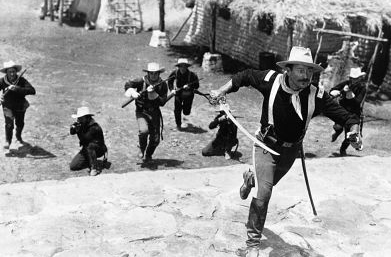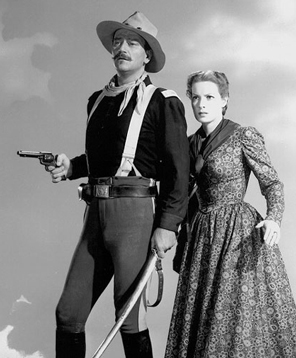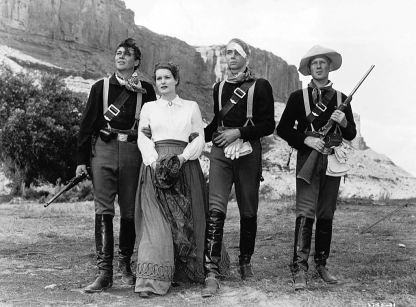
 |
|
|
|
Film reviewers routinely refer to three John Wayne pictures from the late 1940s as the John Ford cavalry trilogy. The extras on Olive Films' new Blu-ray confirm the fact that the third cavalry film Rio Grande was imposed by Republic Pictures as a precondition to funding Ford's pet project The Quiet Man, to be filmed in Technicolor in Ireland. Although the first two cavalry shows were released by RKO, all three were produced independently. John Ford's partner in Argosy Pictures was Merian C. Cooper, the master showman who dreamed up King Kong and who would soon change the course of film exhibition with This is Cinerama. 
The cavalry trilogy is not a series, as John Wayne plays a different character in each. Rio Grande teamed Wayne for the first time with his lasting co-star Maureen O'Hara. Ford welcomed the talented and beautiful actress into his group of favored players, many of which were Irish Americans. This cavalry epic is more conventional and commercially minded than the first two. Lieutenant Colonel Kirby Yorke (John Wayne) is surprised to find that the son he has not seen since the end of the Civil War, is a new trooper in his frontier command. Young Jefferson Yorke (Claude Jarman Jr.) flunked out of West Point and immediately enlisted as a regular cavalry soldier. Kirby has also been separated from his wife Kathleen (Maureen O'Hara) for a full fifteen years; she left him after his Union troops burned all the homes in the Shenandoah Valley, including hers. Kathleen arrives with the intention of buying Jeff's release from the army, but both husband and son refuse to cooperate. She instead joins the rest of the officers' wives and tries to repair her lost marriage. Young Jeff proves himself through his horse-riding ability and in a "soldier's fight". Kirby treats him as he would any other trooper, although his Sgt. Major Quincannon (Victor McLaglen) keeps a protective eye on the boy. Young Yorke makes the grade in every category. Trouble comes when the renegade Apache leader Natchez gathers three tribes on the border river with Mexico, the Rio Grande. General Sheridan (J. Carrol Naish) gives Col. Kirby unofficial orders to illegally cross the border and destroy the Apache warriors. Before that can happen Natchez's Apaches attack a wagon train from the fort, murder one woman and kidnap all of the officers' children. Able Troopers Travis Tyree (Ben Johnson) and Daniel "Sandy" Boone (Harry Carey Jr.) take Jefferson Yorke with them to sneak into the Apache camp to affect a rescue. Rio Grande continues John Ford's laudatory attitude toward the military. The U.S. Army is a masculine Utopia for real men to live life hard and fight their country's toughest battles. This film doesn't examine the social situation in the Army as deeply as does Fort Apache. Kathleen is the only woman in the fort with a speaking role. The dependent army kids are fairly invisible until they're needed for a rescue scene. 
Rio Grande is sort of a romantic warm-up for Ford's much more personal The Quiet Man. In that movie Irish-American John Wayne goes home to Eire to earn a loving home with the redheaded Maureen O'Hara. The central theme of Quiet involves setting up a household to settle down in after marriage. In contrast, Rio Grande is about a marriage that broke up over a house. In his role as a Union cavalryman in the Civil War, Kirby Yorke was forced to burn his own wife's home to the ground. Just the same, Kathleen's grudge against the army no longer seems a serious issue. Kirby and Kathleen give one another longing looks from the moment they are reunited... as Kathleen's purpose for coming evaporates, we're not certain what exactly is keeping them apart. The only reference to the wartime incident comes when Kathleen shames Sgt. Quincannon by repeatedly calling him an arsonist. Ford keeps the Irish clowning, boozing and brawling to a minimum but Victor McLaglen is still there to snap up unguarded beer bottles and to dispense comedy haymakers to mouthy Troopers. The scene where Jeff York is awakened by the smiling faces of his enlisted pals is meant to be a heartwarming display of the Army As Family. The sequence of men grinning intently at a boyish Jeff now looks more like a scene from a '70s prison picture. Director Ford also gives star billing to the cowboy singers The Sons of the Pioneers, padding his movie with at least ten minutes of serenades by "The Regimental Singers". Future Ford player Ken Curtis is the lead tenor; one of the songs is a Yee-hah ditty written by none other than Dale Evans. They also croon the traditional "I Will Come To Take You Home, Kathleen", an un-subtle reference to Kathleen and Kirby's relationship. Ford was reaching for fresh blood for his stock company. Having discarded John Agar, the director put his weight behind rodeo champion and stuntman Ben Johnson, and continued the 'family line' with the son of silent movie star Harry Carey. Only Victor McLaglen seems a holdover from previous decades, along with familiar bit players like the mug-faced Jack Pennick. 
Rio Grande shows John Ford taking a major backward step from his former liberal stance. Fort Apache lauded the Army but presented a highly critical portrait of a George Armstrong Custer-like martinet and glory hunter, who leads his troop on an unnecessary suicide mission. She Wore A Yellow Ribbon is a pacifist, somewhat wistful story of a veteran officer who wants to retire -- both he and his Indian chief counterpart disapprove of "young braves" that agitate for more war and bloodshed. This third cavalry picture does a political about face to favor a militarist posture. The Indians are reduced to bloodthirsty savages that must be put down forcibly. The dithering fools in Washington impose rules that restrain the army's ability to fight. The main topic of conversation between Col. Yorke and General Sheridan is the ban against crossing the Rio Grande, to wipe out the hostiles that use Mexico as a safe haven for their raids. When Rio Grande was released in November of 1950, America was already bogged down in Korea after six months of fighting. Our military leaders expressed frustration that the Reds could simply duck across the Yalu River into China when things got too tough. As if supporting General MacArthur, Rio Grande would seem to endorse taking the war right into China. The rescue of the children gives Rio Grande a needed big action ending. It plays like something out of a silent movie, or Ford's own Drums along the Mohawk or even Mighty Joe Young: when in need of a sentimental finish, threaten a child. Ford even reaches for symbolism by showing his brave troopers shooting at the Indians through a slot in the chapel door shaped like a Christian cross. 1950 was the year of Delmer Daves' overcompensating "Indians are good" western hit Broken Arrow, and Anthony Mann's fiery Indian Civil Rights movie Devil's Doorway. Ford's westerns would soon reflect the Civil Rights era by showing more sensitivity to the plight of Indians and other minorities, but the growing militarism in his movies never abated. Olive Films' Blu-ray of Rio Grande looks quite handsome. Bert Glennon's sunlit scenes yield more detail in the added resolution of HD. We can better appreciate photographic effects achieved by shooting at dusk and in the early morning hours. Olive has also improved its packaging and menu design, although more proofreading would help -- the menu incorrectly lists a 1993 featurette as being about High Noon. Host Leonard Maltin interviews the late Michael Wayne and actors Harry Carey Jr. and Ben Johnson. Johnson talks about signing his contract with Ford and the movie's two-horse "Roman" riding stunt. He offers a few anecdotes about John Ford's dictatorial cruelty on location, while Harry Carey Jr.'s memories are more reverential.
On a scale of Excellent, Good, Fair, and Poor,
Rio Grande Blu-ray rates:
Footnote: 1. Some good information from Chris, 8.12.12: Hey Glenn, Enjoyed your review of Rio Grande. It's the least of Ford's Cavalry Trilogy but still entertaining thanks to Wayne and O'Hara. I'm surprised you didn't note the similarities to Major Dundee, with the unauthorized mission into Mexico to rescue kidnapped children. Your analysis of the picture as a Korean War allegory is very shrewd. I don't know about Ford but Wayne definitely saw it that way. Quoting from Michael Munn's John Wayne: The Man Behind the Myth (p. 133): "Rio Grande... was written as a metaphor for the invasion of South Korea by North Korean Communist forces. In Rio Grande, it's the Apaches who come across the border to make their attacks, and then go back over the border where the cavalry weren't supposed to go. But Lt. Col. York... knew he had to lead his men across the border to save the lives of innocents. In Korea the Communists were making their raids into South Korea and then going back to the North. I felt that our forces should have gone after them, and that's what York did... and it was the right thing to do." Regards, Chris
Reviews on the Savant main site have additional credits information and are often updated and annotated with reader input and graphics. Also, don't forget the 2011 Savant Wish List. T'was Ever Thus.
Review Staff | About DVD Talk | Newsletter Subscribe | Join DVD Talk Forum |
| ||||||||||||||||||